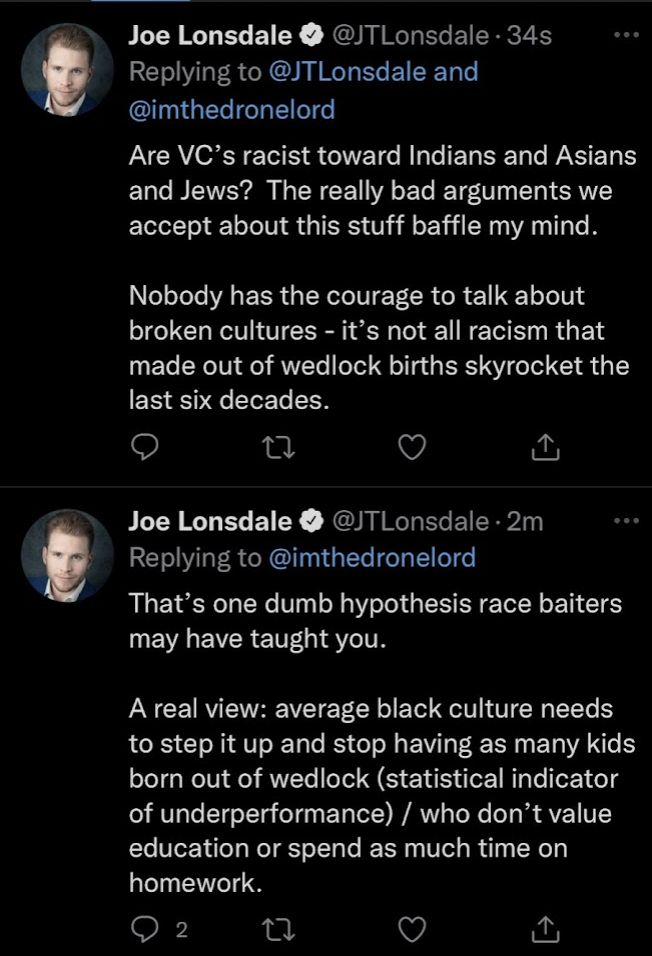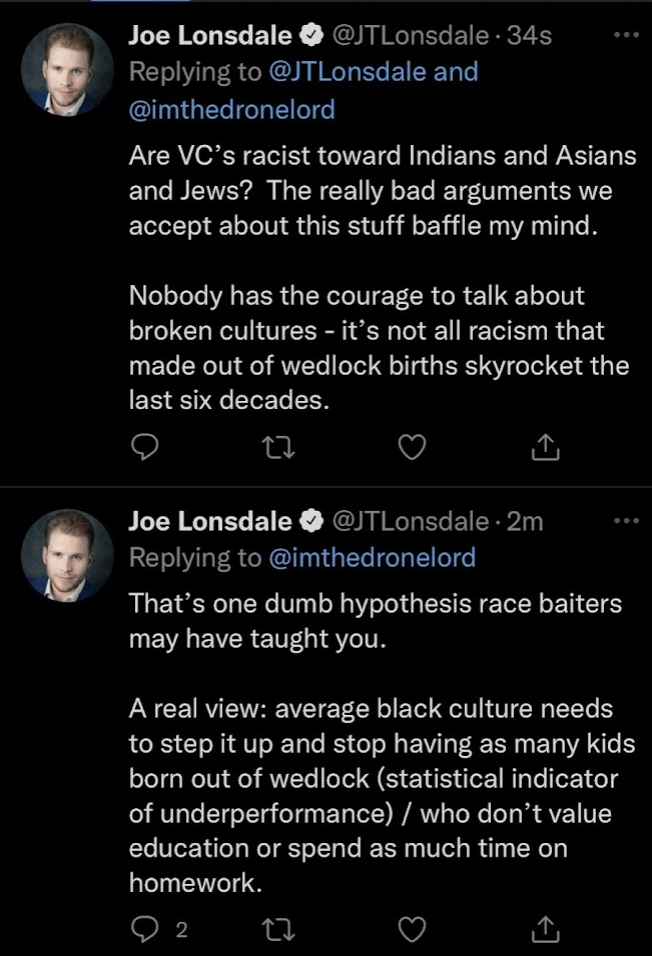Over the last couple of days, 8VC partner and Palantir founder Joe Lonsdale shared a Twitter thread that he has since deleted. In it, he shares his view on “average black culture”—where education isn’t valued and having too many kids out of wedlock leads to Black systematic underperformance.

I’ve never met Joe Lonsdale. I don’t know if he’s a good person or not. We’ve never run into each other on a deal and perhaps it’s a bit unfair to pick him out among all of the folks in VC who you know also have problematic views on race—because he’s definitely not the only one.
But by sharing these thoughts out so blatantly and defending them in subsequent threads, he’s bringing scrutiny on himself. No one’s perfect—certainly not myself—but we have to draw a line somewhere in our industry.
What level of willful ignorance on racial issues are we willing to tolerate in our capital allocators?
In my opinion, that’s really what racism is. It’s willful ignorance—and I don’t know about you but I signed up to participate in an industry with the best and the brightest.
Is it my place to call him out? Certainly I’m not a faultless person—but that shouldn’t matter. You can “what about” all you want, but I’m just personally tired of having to deal with idiots, and this particular idiot just got under my skin today.
I can’t even fathom how tiring it would feel if I was Black.
You wouldn’t hire an analyst who has a dismissive take on Web3, DTC or information security without doing the work—so why would you tolerate a partner at a venture capital fund who dismissive an entire group of people based on the color of their skin?
Evils of racism aside for a moment, that’s just… well…
Dumb.
His view is reflective of an intellectual laziness around racial issues in the technology industry. Theoretically intelligent people in positions of privilege just aren’t interested in putting in the time to investigate complex and highly inter-dependent issues of access, wealth, race, and privilege.
Remember this gem?

Meanwhile…

Yeah, they’re not sending their best.
Back to Joe Lonsdale.
If you’re a Black founder and he knows nothing else about you, seems like Joe’s assumption will be that a) every single one of you came from the very same culture—whether you grew up rich in Alabama, poor in Connecticut, immigrated from Haiti as a kid or recently arrived from Namibia and that b) your culture doesn’t value things like marriage and education.
Not only that, he sees marriage as the only acceptable form of parental participation by multiple parents in a child’s life—dismissing trends towards co-habitating parents and various flavors of co-parenting relationships.
I wonder what he thought before gay marriage was legalized.
Anyone who spends even a small amount of time researching and thinking critically will find complexity in this issues that can’t be adequately covered in a tweet.
While solo parenting does correlate with worse economic outcomes for kids, it’s not like we’re doing much in the way of actually supporting single parents and their careers by providing free childcare or anything.
Perhaps it’s not the marriage part, it’s the poverty part.
If you look, there’s lots of evidence that support for marriage as a valued institution within Black communities is actually quite high.
You can’t have this conversation without reconciling the startlingly low numbers of economically independent single Black men in many of these communities, due in large part to policies of mass incarceration, subsequent discriminatory hiring practices and gun violence.
This exacerbates an already existing problem of wealth in Black communities thanks in large part to redlining that perpetuated a widening gap between white and Black families over generations.
We created policies that purposely infect Black families with housing instability, disproportionally incarcerate Black men—evidenced by the fact that Blacks are are 40% of drug violation arrests but only 13% of admitted drug users, and then even when we do decriminalize our society by making pot legal, we don’t allow anyone with a prior drug conviction to make money off it.
But still, Lonsdale thinks the problem is a “Black culture” that doesn’t focus enough on kids doing their homework.
If you’re a Black founder, do you think that view is going to help your already low chances of getting a check when you pitch 8VC?
Ironically, Lonsdale also thinks that dads who take full paternity leave are “losers”. So, even if you grew up in a Black family with a father who was so present that he maxed out his paternity leave, your dad’s a loser.
That also makes its fairly obvious what Lonsdale thinks a mom’s role in a household should be.
Or is any parent that maxes out on parental leave a loser? If I were a female founder pitching him, I don’t think I’d want to find out.
It would be easy to have a knee jerk reaction to Lonsdale’s comments and just call him a racist as many people have done.
To me, that’s letting him off easy, especially since Lonsdale himself doesn’t seem to actually understand or care what people mean when they call you or your actions racist.
To him, and to many other white men in power, being a racist only means regularly using the N-word, wearing white hoods perhaps, burning crosses—just the most egregious of stuff. They’re not that, so they don’t ever see the word racism applying to them in any way.
Trust me. I’ve been there myself on telling myself that.
Everything else just seems to fall under the category of “free speech” or Tucker Carlson-esque “just asking questions”.
After all, how on earth could Joe Lonsdale be racist when 8VC does, in fact, count a Black employee (the company’s receptionist) among its team of over 30?
He’s funded Black founders, too, so he definitely can’t be racist.
An examination of Lonsdale’s other tweets demonstrates that he doesn’t really care for what he sees as “woke culture” and being called racist by people who ascribe to what he sees as an “everything’s racist now” approach.
He clearly doesn’t really subscribe to the view that, yeah, there’s actually a lot of racist shit baked into the fabric of our society and our attitudes towards one another and yes, we’ve been doing a lot of rightful calling out of it in the last couple of years.
God forbid white professionals in power should take any responsibility for the system we’ve benefited from, regardless of our individual actions to perpetuate it.
I don’t know if his view comes from insecurity around his privileged position—the fear that if anyone took away the wind at his back of being a wealthy white straight man, he wouldn’t be able to hack it on an even playing field, or whether it’s just intellectual laziness, that he’s just not willing to put in the effort to listen, process, unlearn and relearn how to be a decent person to all other people in our society.
It’s a shame, though, because anyone really dedicated to change has had some really enlightening and sometimes difficult conversations and reflections that I’m sad for him that he’s missing out on.
The lines have been drawn and you’re either a white person who accepts that we participate and benefit from structures of racism, and genuinely wants to know more about how to make it better, even if you don’t agree with all of the proposals, or you’re dismissive and seemingly annoyed by the whole conversation in general.
As a social policy, I don’t believe anyone in the latter category should be in charge of allocating capital and therefore acting as a gateway to wealth creation in a world of wealth disparity—but I guess this asset class isn’t really here to make the world a better place.
So, from a pure returns perspective, I’d like to make the case that even if LPs don’t care if you’re racist from a moral or even optics perspective (they didn’t seem to care about prior rape accusations or that he’s banned from teaching or mentoring at Stanford for a decade for violating student relationship policies when they gave him hundreds of millions of dollars), such a biased and ignorant approach to race will almost certainly cost him returns relative to his peers and they’ll definitely care about that.
In fact, I would advise any LP in his fund to call him up this week and say, “Can you convince me that if the Black founder of the next great company is advised to pitch you, and sees what you wrote, you’ll be able to win that deal?”
If the answer is no, why would they invest in his next fund—especially when they probably just put together a whole diversity initiative to back more diverse GPs who, in turn, would find a broader group of founders who have historically been overlooked?
What’s the point if you’re going to fund VCs who think the way he does?
To fully understand why Lonsdale is going to be behind the eight ball making money in the next decade or two of venture capital, you have to understand the fundamental change going on—and that’s decentralization.
The world is becoming more about small pieces loosely joined.
Everyone working on Web3 is trying to build the architecture where the power is pushed out from the middle towards the edge, so we don’t get any more data monoliths like Facebook or Google that extract value and amass power, both from and at the expense of individuals, through scale.
This isn’t just happening within technology itself—but in the human and financial networks surrounding tech. In fact, that move has been happening for a long time.
Back in the 1960’s and up through the 1980’s, if you had a technology project you wanted to get funded by VCs, you had to be geographically located near one of only a couple of tech centers—MIT and Stanford. You also had to be “in-network”—friends of friends with just a handful of investors who were doing this kind of thing.
VCs held all the keys to the castle and it wasn’t easy for outsiders to get over the wall.
The onset of social technologies at the same time the open-source movement took hold allowed more people more access. When I joined Union Square Ventures in 2004, one of the very premises of the fund was that anyone anywhere could get started building a tech company for a fraction of what it would have cost just a decade before.
Interestingly, that very same tech enabled USV as a firm to gain a foothold and climb into the upper echelons of the venture capital hierarchy. By directly communicating to the founder community through blogging, Fred Wilson and Brad Burnham grew a fan base and a reputation that enabled them to be highly sought after investors.
I remember one time when a west coast founder came and pitched to us and said, “You know, I normally wouldn’t be pitching an East Coast VC, but I’ve been reading what you’ve been writing and I know this is going to be a good conversation.”
That was only a taste of the venture capital democratisation to come—because however amazing it was that a new firm could use a blog to attract top founders and run stride for stride with the Silicon Valley elite, it was still a firm run by two white men who had enough capital and connections to kick off a first fund close through their own network.
We’re starting to see things in the capital formation world change significantly. The entire VC tech and finance stack has been upended into a much more turnkey infrastructure. Today’s new investors are taking what USV did 18 years ago to the next level through rolling funds and syndicates, paired with Discord and Twitter communities—and it looks like a crypto token/DeFi based economy will upend these structures even further. We will likely get VC funds in the future that are run as DAOs.
At the same time that barriers to capital formation are coming down and deal flow decouples from centralized institutions, industries are undergoing a reckoning of who historical holders of power are and how diverse the participants are. LPs are getting behind new Black GP-led funds and those numbers will only increase as more and more people build up investing track records of their own through the community tools of increased financial participation.
In this world, founders have the advantage—because there are many more sources of funding and a heck of a lot more transparency into the thoughts and actions of the check writer. When founders aren’t only to be found in two geographic places, all formally working for the same four companies, and funders can be anyone, participation in online commons and reputation within those spaces is going to be not just an advantage, but a prerequisite.
It’s becoming less and less important that, as an investor, you were part of the basically white male PayPal mafia and more important that you actively contribute value to diverse founder communities today.
No longer can you just get deals by being a gatekeeper—the person with the lone connections to X, Y, and Z resources. Now, founders have choice and your positive reputation both as a professional and as a person needs to find its way to a broad audience in order to surface founders from a myriad of new start up origin stories.
Founders will raise their hands from the far corners of the web and say, “Yes, I’ve heard or this investor and like what they have to say and share values with them, so I’m going to pitch them.”
The next top company is more likely than ever before to be started by a diverse team—or at minimum a team that sees diversity in its workforce as critical to its success.
Does Joe’s perspective on Black culture make him more or less likely to be a VC of choice for the next great team? What happens when a Black software engineer clicks around Crunchbase to see who the backers of a company are and finds their way to Lonsdale’s tweets?
Founders don’t need the extra burden of dinosaur views on race being advanced by their investors. It’s, at best, a distraction from the mission at hand and, at worst, a signal that a diverse group of the most talented people aren’t equally welcome in the circles that VCs like this frequent.
If you aren’t willing to actually try to understand where different people are coming from, what’s the liklihood that you’re going to be able and willing to work out complex problems on diverse boards or have the best and broadest network of people that can help my company?
Founders can do better than VCs like this and so can LPs.










